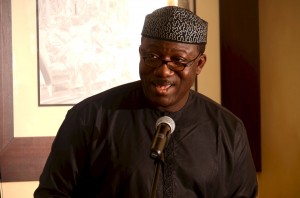Ekiti State Governor, Dr. Kayode Fayemi, on Monday described ethnic affiliations and tribalism on the part of Nigerian leaders as bane of the practice of true federalism in the country.
Speaking in Ilorin at the 2012 Biennial Law week of the Ilorin Branch of the Nigerian Bar Association (NBA) on the theme: “ Federalism and the Quest for National Integration and Development in Nigeria”, the Governor said the character of leadership since the advent of federalism in Nigeria betrayed the concept of true federalism as they only advocated federalism in name, but actually worked towards the accruement of advantage to their ethnic units.
Fayemi added that the question of citizenship in Nigeria has prevented many Nigerians from operating effectively outside their states of birth, saying that “this primordial sense of identity in relation to a space precludes a person from being granted equal status like another who was born or locates his/her origin in that State.”
“Equally, the character of the leadership that Nigeria has experienced since the advent of a federal system in the country has constituted a very significant challenge that has been remarkably formulated into the notion of “Two Publics” by Peter Ekeh, which make ethnic affiliations and affirmation privileged over the national good. As such, some of Nigeria’s leaders/rulers have been described as ‘nationalists by day and tribalists by night’, as they only advocated federalism in name, but actually worked towards the accruement of advantage to their ethnic units”, he said.
While identifying resource control as a core trigger of conflict and a major weakness of the Nigerian federalism, Fayemi described this was one of the fundamental factors for the overwhelming agitation for the renegotiation of our union in the country.
The Governor added that it is without doubt that access to power is the primary driver of the politics of the fiscal federalism and the nature of the derivation principle that is adopted.
“Within the Nigerian experience, the access to political power is vital in determining the allocation and distribution of resources, and it provides the opportunity for those who control power to expropriate a large percentage of the wealth from the resources to their own advantage, even at the expense of those who possess the resources. And, while this control and mode of distribution in Nigeria have been highly contentious, they have also been underscored by numerous revenue sharing formulas or allocation principles, which have sought to de-emphasis ‘derivation’ – in varying degrees – as the most significant factor in resource allocation”, he said.
On the Nigerian integration, the Governor stressed the need for a National Conference, in which the various constituencies and groups in the country would come together to renegotiate the terms of the Nigerian union, and “deal decisively with all the nagging and contentious issues that have been animating the country in a negative manner.”
Fayemi identified the influence of years of military rule in Nigeria and the exclusive, personality driven projects of current civilian rulers as factors that have compounded the recent crisis and underplayed the need for dialogue has; saying that the “militarisation of the national psyche also affects individuals in their daily lives”.
“The immediate causes of increased violence and crime include the high unemployment and poverty levels. At root however is the loss of a culture of compromise and accommodation. This point cannot be over-emphasised: Nigerians lost their culture of dialogue in a period when militarisation and the primacy of force had become state policy. Nigeria needs a return of the culture of dialogue.
“This may not necessarily culminate in a sovereign national conference, although some perceive this as the only solution to the crisis of governance in the State. Any indication that government is willing to create the conditions for dialogue in the country is bound to reduce the increasing level of tension since many within deprived communities now believe the only language that government understands is violence. The need therefore for a national conference as a means of lessening tension in the country is not only desirable but necessary,” he submitted.
Last modified: June 12, 2012

